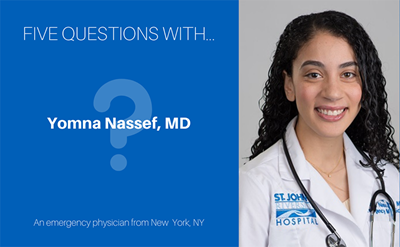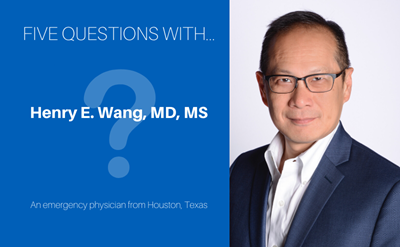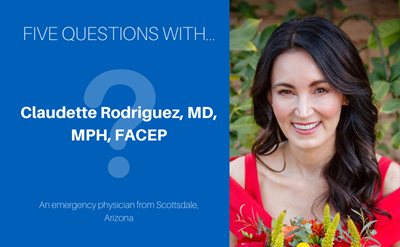Aisha Terry, MD, MPH, FACEP is an emergency physician in Washington, DC.
As a professor of emergency medicine and health policy, you have a rare chance to mold future leaders in health care. What inspired you to become an emergency physician?
The work of an effective emergency physician is in many ways like a calling, in my opinion. We are privileged with the opportunity to do good for literal strangers in critical need, every day. While that is an awesome responsibility, it also provides me with immense fulfillment and adds to my sense of purpose. Caring for the most vulnerable of populations who otherwise might have no alternative is the aspect of emergency medicine that most inspired my decision to pursue it. Understanding the importance of proper training and mentorship is what influenced my decision to not only practice medicine, but also teach it. I love to teach! Even when I am physically and mentally exhausted, teaching fills my tank every time with spiritual strength; and that’s what I call joy!
As a physician, professor and policy expert, you work at the intersection of these critical fields. How have you drawn on your array of experiences and education to help you as a doctor?
Practicing at the intersection of these three fields is truly exciting and creates an amazing trifecta of experiences that no doubt make me a better doctor and a better human being. It provides me with tremendously diverse context that I try to bring to every patient case. It helps me approach my profession with a broader perspective and deeper understanding of the critical nuances of health care – ranging from the intricacies of pathophysiology, to the art of training competent physicians, to having the skills to effectively lobby a health care bill on Capitol Hill. Further, having incorporated these fields into my career for nearly 20 years now, I have been afforded the opportunity to watch all three fields evolve, coalesce, and influence each other, which is quite fascinating.
You’ve dedicated a significant portion of your career to addressing health disparities. What are some ways we as a nation can improve health equity and outcomes in the emergency department?
Emergency departments are uniquely positioned as a barometer of the functionality and effectiveness of our health care system and society. I, therefore, personally believe that emergency medicine likely has the greatest opportunity of all other medical specialties to influence meaningful change relative to quality access to care and health equity. It is critical that we care and responsibly play our role for the greater good of society! We see – up close and personal – the ravages of health inequities on people’s lives from all walks of life, every single day in our emergency departments. While the enormity of the problem is daunting, I don’t believe that excuses us from using our platform and innovative ideas to make our nation’s health care system the premiere vehicle of health promotion and maintenance that it should be. In doing so, I think it first important to understand how diversity, disparities, bias, and the social determinants of health all relate and should be used in a complimentary fashion to re-design a health care system that reaches far beyond the walls of the hospital, acknowledging that only about 10% of preventable death is a result of the medical care that we provide in the clinical setting. Emergency medicine has the opportunity to lead the way in implementing policy-based, systemic action plans which integrate the community and other health resources, by serving as a centralized hub where patient needs can be identified and addressed in a socially conscious way.
While we’re making progress, the field of medicine remains fairly homogenous. What are ways we can empower and support more women and people of color in science?
The amount of progress that has been made relative to gender diversity has been fair in some instances, but that of racial and ethnic diversity has actually been disappointingly relatively flat. It’s first important to recognize and increase awareness around the fact that diversity is not only a moral obligation, but that it also makes really good business sense in terms of improved outcomes. There is endless data which shows that a diverse workforce improves patient satisfaction, increases productivity, and improves workplace wellness. Secondly, diversity rarely finds us; we have to go find it and be intentional about directly seeking a diverse workforce. This approach is often enhanced by lengthening the pipeline proximally such that recruitment efforts begin earlier amongst younger populations. Finally, it’s imperative to understand that diversity without inclusion is poor use of a great resource. We can’t be satisfied with just hiring a diverse workforce, but rather have to also be intentional about creating a culture that consistently nurtures and supports that diversity.
Being from North Carolina, we’re sure you know your way around a BBQ. If you could invite anyone, who are three people you’d want at your next cookout?
I would choose to invite guests for whom I have a deep admiration relative to their extraordinary respective talents and work ethic. I’d want to pick their brains about what drives them to change the world and keeps them motivated to consistently be such hard workers. I’d invite Oprah Winfrey as I think that her rise to being one of the most influential people in the world is more than impressive, given her background and challenges she faced. I’d also be honored to have the late Michael Jackson join me as he was an absolute entertainment genius with inherent talent, who also who never stopped perfecting his craft. Finally, I would be ecstatic to have my late mother, Ludia P. Burden, who was a nursing professor for nearly 35 years, sit down and chat with us at the cookout. She was the most fearless, yet compassionate person I’ve ever met, and taught me everything I know. If I can be half as good as she was, I’d be satisfied. I’d ask her how she thinks I’m doing.
 American College of Emergency Physicians
American College of Emergency Physicians







